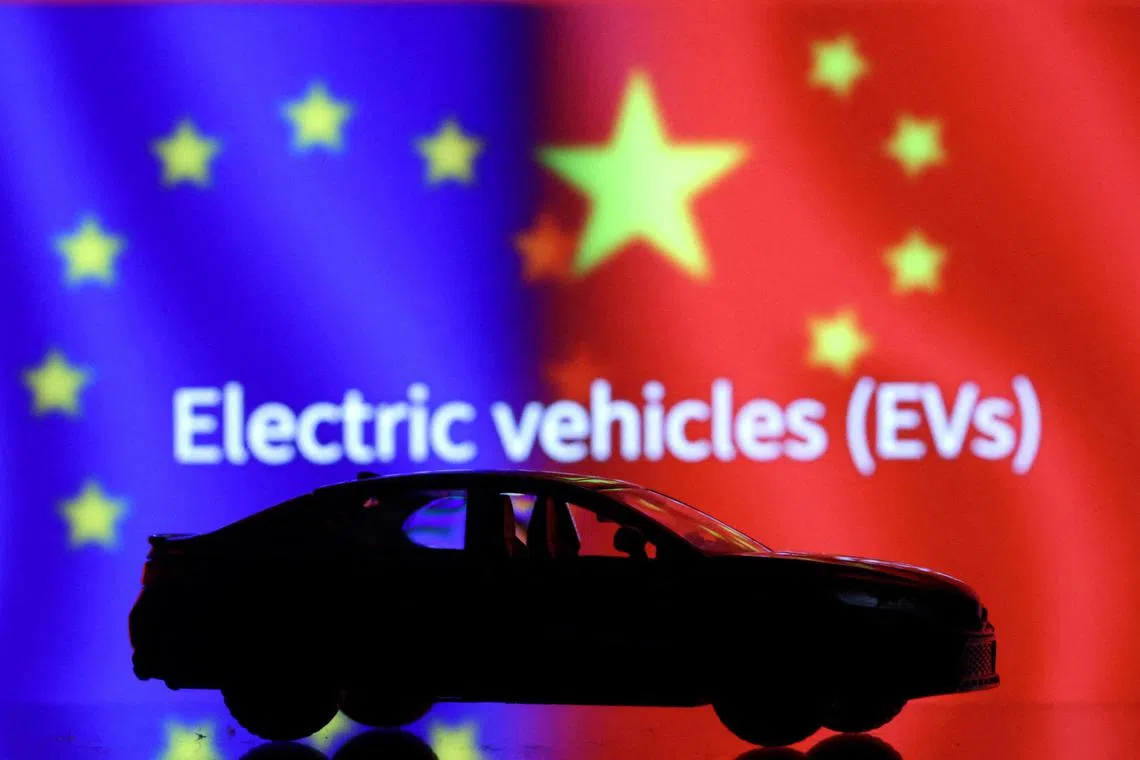EU to impose tariffs up to 45% on EVs from China
Sign up now: Get ST's newsletters delivered to your inbox

The decision by the EU comes after an investigation found that China unfairly subsidised its EV industry.
PHOTO: REUTERS
BRUSSELS – The European Union voted on Oct 4 to impose tariffs as high as 45 per cent on electric vehicles (EVs) from China in a move set to increase trade tensions with Beijing.
The European Commission’s proposal to impose definitive tariffs on Chinese-made EVs
It added that it would continue negotiations with China in parallel “to explore an alternative solution that would have to be fully WTO (World Trade Organisation)-compatible, adequate in addressing the injurious subsidisation established by the commission’s investigation, monitorable and enforceable”.
The commission, the bloc’s executive arm, can now proceed with implementing the duties, which would last for five years. Ten member states voted in favour of the measure, while Germany and four others voted against and 12 abstained.
China’s Commerce Ministry expressed strong opposition to the EU’s vote to impose tariffs on China-made EVs, calling this an “unfair, non-compliant and unreasonable” protectionist practice.
The ministry also said in a statement that China noted the EU’s political will to continue to resolve the issue via negotiations, adding that a China-Europe technical team will continue talks on Oct 7.
The country will take all measures to firmly safeguard interests of Chinese enterprises, the ministry added.
Chinese car giant Geely – one of the country’s largest EV sellers – expressed “great disappointment” over the EU’s move.
“The decision is not constructive and may hinder EU-China economic and trade relations, ultimately harming European companies and consumer interests,” the firm said.
The EU decision comes after an investigation found that China unfairly subsidised its industry. Beijing denies that claim and has threatened to impose its own tariffs on the European dairy, brandy, pork and auto sectors.
The bloc is actively trying to reduce its dependencies on China, with former European Central Bank president Mario Draghi warning in September that “China’s state-sponsored competition” was a threat to the EU that could leave it vulnerable to coercion. The EU, which did €739 billion (S$1.06 trillion) in trade with China in 2023, was split on whether to move forward with the duties.
The EU and China will continue negotiations to find an alternative to the tariffs.
The two sides are exploring whether an agreement can be reached on a mechanism to control prices and volumes of exports in place of the duties.
The European Commission has repeatedly said that any alternative to tariffs has to have strict requirements, including alignment with WTO rules, address the impact of China’s subsidies and be something the EU can monitor for compliance.
The new tariff rates will be as high as 35 per cent for EV manufacturers exporting from China. The new duties would be on top of the existing 10 per cent rate.
Chinese EV makers will have to decide whether to absorb the tariffs or raise prices, at a time when slowing demand at home is squeezing their profit margins. The prospect of duties has prompted some Chinese automakers to consider investing in factories in Europe, which might help them dodge tariffs.
The additional tariffs already have slowed Chinese carmakers’ momentum in Europe, with their sales plunging 48 per cent in August to an 18-month low. The region is a desirable destination for the nation’s manufacturers because EVs sell in relatively high numbers and at much more robust prices there than in other export markets.
The share of electric cars sold in the EU that were made in China climbed from around 3 per cent to more than 20 per cent in the past three years. Chinese brands accounted for around 8 per cent of that market share, with international companies that export from China, including Tesla, taking up the rest.
Still, Europe’s tariff hike will have a “minor impact” on Chinese manufacturers because the region accounts for only a fraction of their total sales, according to Daiwa Securities analyst Kevin Lau. Europe contributed between 1 per cent and 3 per cent of overall sales for BYD, Zhejiang Geely and SAIC Motor in the first four months of 2024, he estimated.
While Brussels has sought a level playing field for European companies, Germany’s automakers are concerned about blowback that could exacerbate challenges they are already having in their most important market globally. Mercedes-Benz and BMW pressed Berlin to vote against the higher tariffs and urged the EU to negotiate with Beijing.
German automakers, including Volkswagen, Mercedes-Benz and BMW, would be hit hardest in a trade spat as China accounted for roughly a third of their car sales in 2023. Bloomberg


